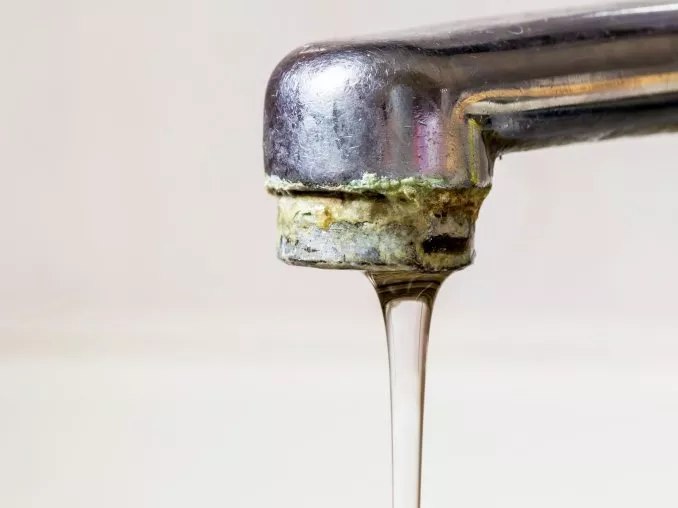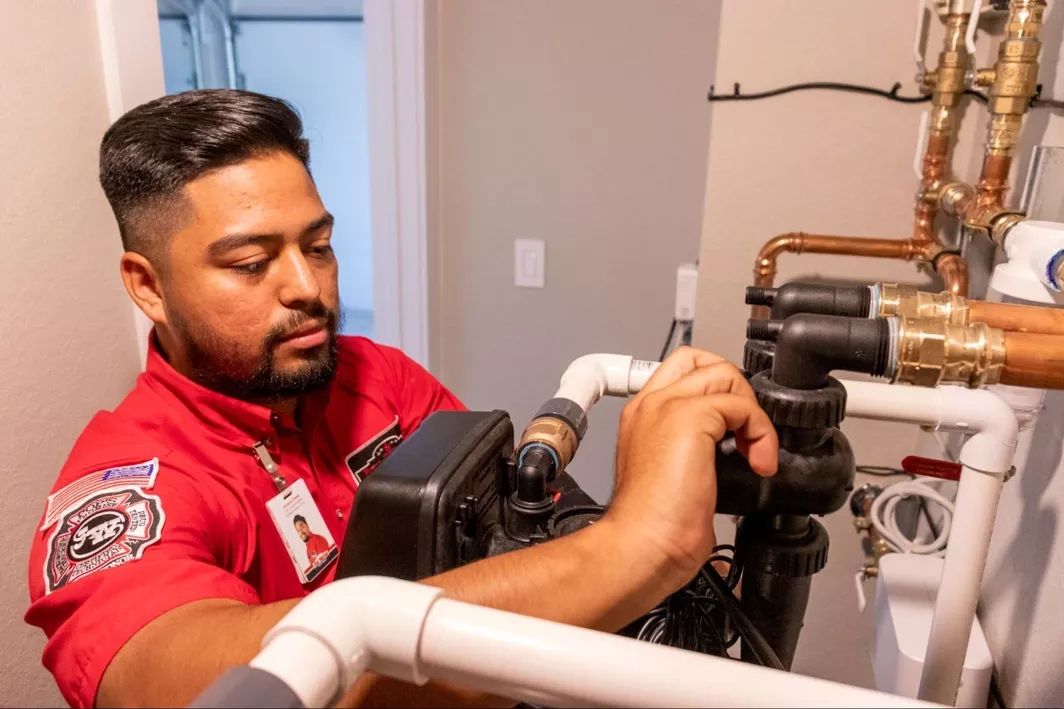What is Hard Water?

Hard water is water that contains higher-than-average levels of minerals. The most common minerals found in hard water are magnesium and calcium. In general, water with mineral levels of 0-60 mg/L is considered soft water, while 61-120 is moderately hard, 121-180 is hard, and 180+ is very hard, according to the USGS.
Unfortunately, residents of San Antonio regularly encounter hard water issues. In fact, San Antonio is home to some of the hardest water in the nation, with levels measuring around 357 mg/L.
While hard water doesn’t typically pose any health issues, it can cause problems in your household. In the blog, we’ll go over the following:
- How hard water is formed naturally
- Why hard water isn’t dangerous
- The troubles of hard water
- How to prevent hard water
So, what is hard water? We’ll answer the question in greater detail and explain some of the common household problems that can result when your home is running on hard water.
Want to eliminate hard water in your San Antonio area home?
Contact Jon Wayne today for a free estimate on our water softening services. Our plumbing services come with a 100% satisfaction guarantee, and our experienced plumbers get the job done right the first time.
How Hard Water is Formed Naturally
Rainwater falls all over, and as it travels through the ground, it naturally absorbs minerals. The type of terrain surrounding your home typically determines if your local water is hard or soft, though municipal water supplies often have treatment centers that soften local water. Hard water is relatively common if your area has a lot of limestone in the ground.
Generally, homes with well water and in suburban or rural areas tend to have harder water than in cities where water is treated.
Why Hard Water Isn’t Dangerous
Hard water isn’t dangerous because minerals often provide various health benefits and are necessary for a healthy diet. For example, calcium is a building block for good bone density, while magnesium helps support muscle and nerve function and regulates energy. Consuming these minerals has no known detrimental effects and may benefit your health. However, the smell and taste of hard water can be off-putting for those not used to it, particularly when the water contains higher-than-average levels of sulfur.
The Troubles of Hard Water
Hard water may not cause any problems when you drink it, but it can be a problem in your home. Soaps and detergents react with hard water to create a sticky, compacted substance called soap scum. Mineral deposits can also develop throughout your plumbing and appliances. Let’s explore some of the negative effects of hard water in your home.
On Your Skin and Hair
When hard water comes in contact with the skin, it can leave a residue that causes dryness, irritation, and itching. This is because the minerals in hard water can strip away the natural oils in the skin, leaving it feeling dry and uncomfortable. Similarly, when hard water is used to wash hair, it can cause damage by making it dry, brittle, and prone to breakage. Hard water can also cause a buildup of minerals on the scalp, leading to dandruff and an itchy scalp. Therefore, it is important to consider the water quality used for personal care and take steps to minimize the negative effects of hard water on hair and skin.
On Your Plumbing Fixtures
Hard water picks up minerals as it travels, but it can also shed them, leaving them to cling to the walls of your pipes and build up in your appliances. The buildup left behind can:
- Encourage bacteria growth
- Impact your water heater’s efficiency
- Damage all water-using appliances and clog lines
Consider your dishwasher. The line that connects it to your water supply is vulnerable to clogs from scaling. Anywhere there is a nozzle dispensing water, you can also have buildup that may reduce your water pressure at those locations. Sink faucets and showerheads are both at risk.
On Your Pipes
In your water pipes, the buildup can slowly reduce the diameter of your pipes, increasing the internal pressure. Smaller pipes mean less water makes it to your taps, leaving you waiting longer for the washing machine to run or to fill up your bathtub.
Buildup can also impact your drain pipes. That soap scum that takes forever to rinse off your skin can also cling to the sides of your drain pipes, creating clogs. Hair and other hygiene products can mass together to create hard-to-shift blockages that may need professional plumbing help.
In addition, you may need to use more detergent and soap to get things clean when washing with hard water. White spots left over on clothing or dishes may also be an issue.
How to Prevent Hard Water
If you want to avoid paying for extra detergent and more frequent maintenance on your plumbing and appliances, a water softening system is the most direct way to handle hard water. While preventing hard water formation is almost impossible, you can stop hard water from flowing through your home with a whole-home softening system.
A whole-home softener uses an ion exchange process to remove the extra minerals from the water. Most water softeners use sodium as the exchanger for the minerals in your water, so it’s important to be aware of the higher salt intake that comes with these systems and explore alternative chemical solutions for those on a low-sodium diet.
Once installed, water softeners give you the following:
- Cleaner dishes without white spots
- Less soap scum in the tub and on your skin
- Fewer trips to the store to stock up on detergents and soaps
- More time between appliance replacement services
- Water that tastes better
Ready to install a whole-home water softener? Call Jon Wayne today!

Call in our experts at Jon Wayne today. We have a decade of experience with water softener installations and are always ready to provide fast, reliable service. You can count on flat-rate, upfront prices and honest, energy-saving advice. For exceptional customer service that puts your needs first, call us today. We’re here to help!
